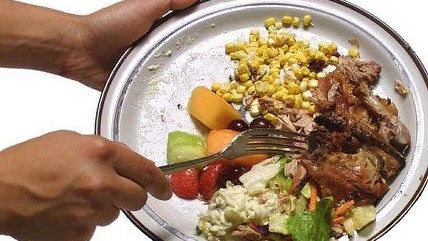New Study Blames Instagram for Food Waste. Seriously.
New studies blame Instagram and gluttony as causes of food waste.


Food waste is an enormous problem. But if two recent studies on the causes of food waste are to be believed, then a solution to that problem is likely at hand.
The respective studies, both British, suggest that Instagram and overeating are culprits behind food waste.
Before I delve into those studies, it might be helpful for me to explain what food waste is, and why it's a problem. Food waste is defined generally as quality, edible "food that completes the food supply chain up to a final product… but still does not get consumed because it is discarded, whether or not after it is left to spoil."
As I discuss at length in my recent book, Biting the Hands that Feed Us: How Fewer, Smarter Laws Would Make Our Food System More Sustainable, food waste has tremendous economic and environmental costs. Consider, for example, the water, land, pesticides, fuel, and labor that were used to produce and dispose of food that wasn't eaten. The uneaten food typically ends up belching methane—a potent greenhouse gas—in fields or landfills. Food that goes to waste also can't be used to combat hunger.
The causes of food waste are myriad. Some of those causes include laws and regulations—many of which I condemn in my book—that promote food waste by, for example, encouraging the overproduction of food.
We've long known that there's no one cause of or solution to the problem of food waste. But as more research becomes available, and more efforts to combat food waste take hold, there's hope we can begin to address the problem.
But—as the British studies suggest—are Instagram and gluttony the real culprits?
Take the idea that Instagram is the cause of food waste. The suggestion comes from a report promoted by Sainsbury's, the British grocery chain.
Today's younger generation in particular wastes food at a higher rate because, says a Guardian article that highlights the study's conclusions, they're "the most likely to try unusual recipes to create Instagram-friendly dishes, involving exotic ingredients that are harder to reuse." And that, the study claims, leads to waste.
I'm skeptical. While I've no doubt that today's seventeen-year-old Brit prepares food at home from time to time, both from my personal experience and from time spent teaching a college course on food and social media, the phenomenon of Instagramming food—and I'm as guilty as anyone—is largely something that happens outside the home, at restaurants.
Given that, then the Sainsbury's study becomes less about what some people are buying and more about where they're often buying it—at restaurants instead of grocers… like Sainsbury's.
The study's blaming of today's younger generation and Instagram rings hollow to Millennial Guardian columnist Nell Frizzell, too.
"But to lay the blame at the feet of Instagram, young professionals, social media, exotic flavours and an interest in aesthetics seems partial, if not actual nonsense," she writes.
The other recent British study—by University of Edinburgh researchers—takes a far more expansive look at food waste, and concludes gluttony is behind ten percent of food waste worldwide.
Rather than using some version of the definition of food waste I cited above—food that goes to waste—the Scottish researchers looked at "food system losses" and include food that's actually eaten, but which in the eyes of the study authors exceeded the amount of food a person needs to eat to survive. Their study refers to this source of waste as "over-consumption."
Cleaning one's plate used to be a way to ensure food didn't go to waste. This study appears to redefine that approach as, instead, encouraging food waste. It turns we produce more food than we eat into we produce more food than we need to eat. I'm not sure how useful that approach really is.
Surveys have found many consumers care very little about food waste. Blaming Instagram photos of food or over-consumption of food as root causes is unlikely to make consumers care any more about the issue, or to begin solve what is a very real problem.


Show Comments (54)